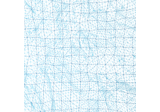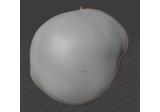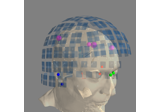mne.read_surface¶
-
mne.read_surface(fname, read_metadata=False, return_dict=False, file_format='auto', verbose=None)[source]¶ Load a Freesurfer surface mesh in triangular format.
- Parameters
- fname
str The name of the file containing the surface.
- read_metadatabool
Read metadata as key-value pairs. Only works when reading a FreeSurfer surface file. For .obj files this dictionary will be empty.
Valid keys:
‘head’ : array of int
‘valid’ : str
‘filename’ : str
‘volume’ : array of int, shape (3,)
‘voxelsize’ : array of float, shape (3,)
‘xras’ : array of float, shape (3,)
‘yras’ : array of float, shape (3,)
‘zras’ : array of float, shape (3,)
‘cras’ : array of float, shape (3,)
New in version 0.13.0.
- return_dictbool
If True, a dictionary with surface parameters is returned.
- file_format‘auto’ | ‘freesurfer’ | ‘obj’
File format to use. Can be ‘freesurfer’ to read a FreeSurfer surface file, or ‘obj’ to read a Wavefront .obj file (common format for importing in other software), or ‘auto’ to attempt to infer from the file name. Defaults to ‘auto’.
New in version 0.21.0.
- verbosebool,
str,int, orNone If not None, override default verbose level (see
mne.verbose()and Logging documentation for more). If used, it should be passed as a keyword-argument only.
- fname
- Returns
- rr
array, shape=(n_vertices, 3) Coordinate points.
- tris
intarray, shape=(n_faces, 3) Triangulation (each line contains indices for three points which together form a face).
- volume_infodict-like
If read_metadata is true, key-value pairs found in the geometry file.
- surf
dict The surface parameters. Only returned if
return_dictis True.
- rr
See also


